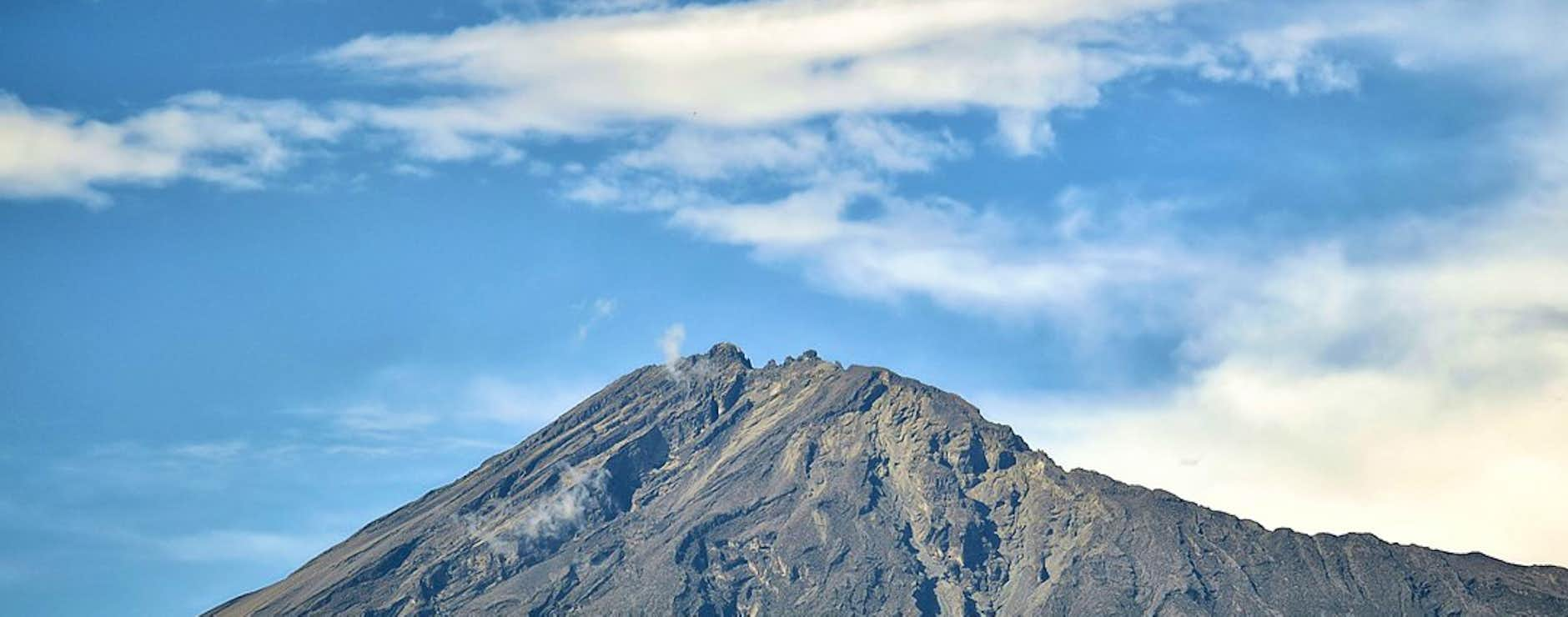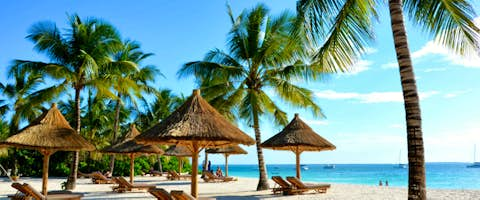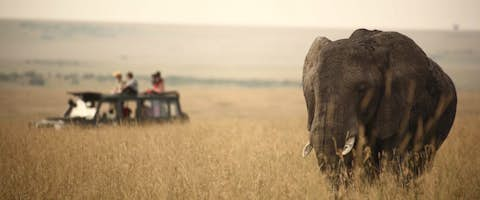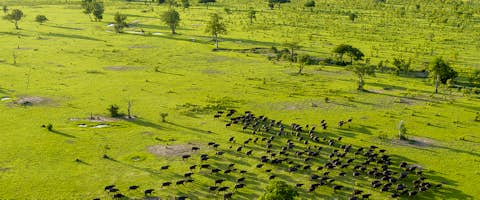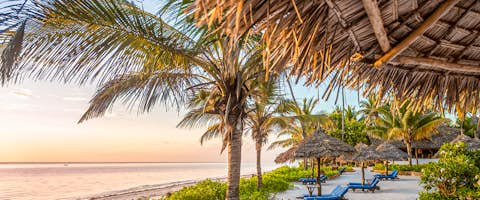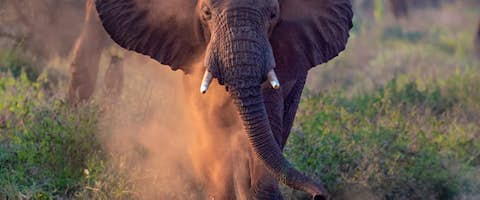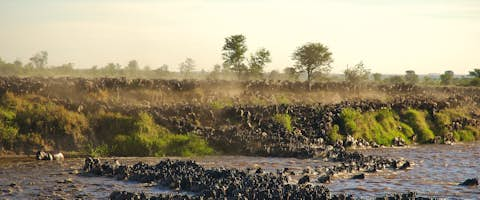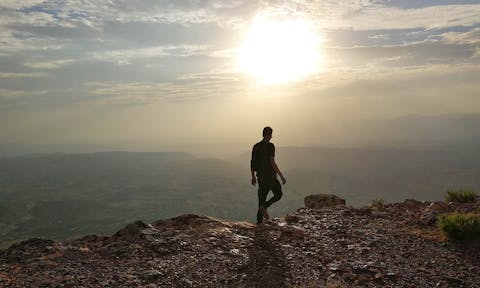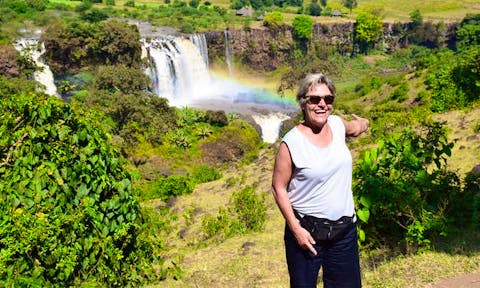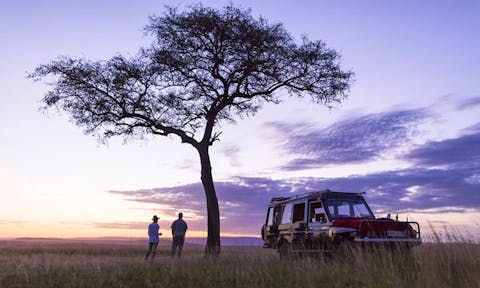Arusha, at a glance
Located in north eastern Tanzania, Arusha is the capital of the Arusha Region. The city is situated under the towering giant Mount Meru, and Mount Kilimanjaro is just 82.6km away.
Arusha was first settled in the 1830s by the Arusha Maasai. These agropastoral settlers belonged to the Arusha Chini community who lived south of Mount Kilimanjaro.
Arusha is the safari capital of Tanzania, and a popular stopover for adventurers who are preparing for a Kilimanjaro trek.
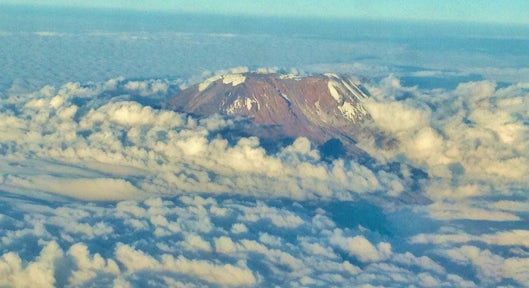
Where does Arusha fit into your Tanzanian adventure?
There is more to Arusha than initially meets the eye. With impressive museums, cultural heritage programmes, crafts, and curio markets galore, there is plenty to explore before you start your safari.
The city is multinational, with Iraqw, Hadzabe, Maasai, South Asian, and European residents.
The streets are bustling, with Maasai women sat on the sidewalks selling their beadwork, Maasai men wandering through town in their traditional red swathes, enterprising businessman trying to sell batiks, and tour guides offering various exciting 4WD adventures.
Despite this intensity, the city has a warm, welcoming atmosphere. Matching the ambiance of the city, the architecture and infrastructure is chaotic, with hectic traffic and old colonial buildings mixed with modern conveniences.
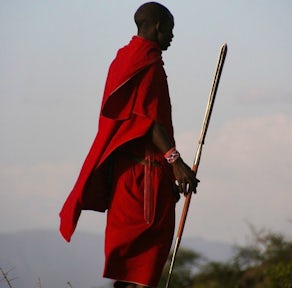
How to get to Arusha?
There are two airports near Arusha. Arusha Airport is a domestic airport with only a few daily flights. It is 15 minutes from the town centre, and it is often the starting point for safaris.
Kilimanjaro International Airport receives daily flights from domestic, African, and international airlines. This airport is around 45 minutes from the centre and a taxi to the airport will cost around $50. Some drivers may accept a cheaper fare, but you will need to haggle.
If you are travelling from Kilimanjaro Airport to the local Arusha airport, allow at least one hour for the journey.
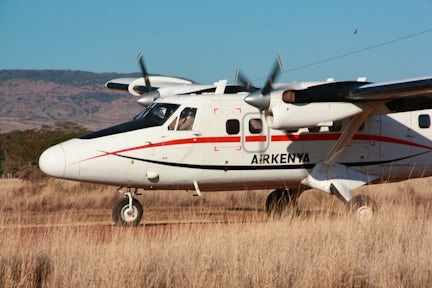
Getting around
It is possible to rent a car in Arusha but parking costs $0.50 per day throughout the city. It is far more common to hire a driver, and this is particularly useful for daytrips to Arusha National Park. If you are renting a vehicle, make sure that there is no charge for ‘extra kilometres’, as this can become expensive.
Dala dalas (small minibuses) are common throughout Tanzania and these only depart when they are full. They cost 400 TSH/person and they operate along the major roads throughout the day. You will find a large station on Stadium Street.
You can also take a bajaji (tuk-tuk) for a one-dollar ride to the city centre. None of these options are particularly comfortable or safe, but they do offer an authentic Tanzanian experience.
Taxis are available and they can usually be found parked in front of hotels. A ride across town should not cost more than $2.50.
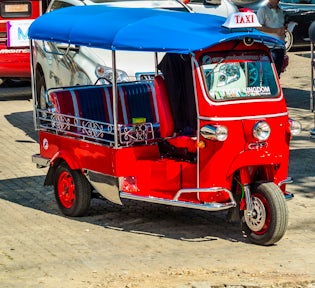
Things to do in Arusha
-
Cultural tourism programmes in Arusha
Cultural tourism programmes are organised in several nearby villages to introduce visitors to the indigenous Wa-arusha and Maasai tribes. They are great alternatives to the safari scene.
These programmes are built around village activities and they can be half-day tours or overnight trips. If you stay overnight, expect basic accommodation – either camping or staying in a traditional homestay.
Some excellent tours include Mkuru, Mto wa Mbu, and Longido. Located north of Mt Meru, Mkuru stands out from the other villages as one of the only camel riding communities.
You can explore the local culture by arranging a camel riding safari guided by Maasai warriors. You can choose between a short safari that lasts for a few hours, or a longer trek to Lake Natron or OI Doinyo Lengai.
Longido town offers splendid walks around the village, with rare wildlife like gernuk, lesser kudu, and klipspringer antelopes living in the bush. Mto wa Mbu is a very interesting tribe with a diverse population, and many residents were attracted to the area by the fertility of its soil.
Each community farms its own produce according to the tradition of their tribal backgrounds. In this village, there are some basic guest houses for accommodation.
With any cultural tourism programme, there is a fine line between community empowerment and simply empowering the entrepreneurs that run them. Nevertheless, the programmes still provide employment for locals, and many of the programmes near Arusha raise money for projects that will benefit the local communities.
For example, the Longido village tour is raising money towards a new cattle dip to protect the herd, which suffers around 1,000 deaths per year.
Other projects fund education, irrigation, or ecological work. Moreover, these programmes are an excellent chance to educate yourself about other people, cultures, and history.
-
Markets and Museums
Learn about the history and rarity of tanzanite. This precious gemstone is unique to Tanzania and you can visit the small museum and makeshift mine on India Street.
Here, you can learn how this coveted stone was created, named, mined, cut, polished, and graded. And of course, you can purchase one of Tanzania’s proudest exports if you wish.
Arusha is filled with craft and curio markets to satisfy travellers who are looking for souvenirs and unique gifts. This is one of the best places to buy Maasai beadwork and jewellery, either from street venders or from the curio shops.
The Arusha central market is a good place to start, and it sells traditional Maasai fabrics, hand-woven baskets, exotic fruit, coffee, nuts, and spices.
The town is home to several interesting museums, including the Boma Museum, which chronicles the fascinating colonial history of the town alongside the tribal history of the area, and the Cultural Heritage Centre, which is dedicated to Tanzania’s culture.
The Cultural Heritage Centre explores Tanzania’s history, wildlife, and culture, and has an excellent shop which sells unusual souvenirs. This shopping experience is hassle free and you will find some truly unique experiences, although the prices are a little higher.
The Mt Meru Curios and Crafts Market, sometimes referred to as the Maasai Market on Fire Road, is another popular shopping destination. It may take some confident bartering and time to pick out the best items, but this has some of the best options in the city.
Other shopping options include the Maasai Women Fair Trade Centre, Shwari, Shanga, and Jamaliyah.
-
Coffee
The area has a strong coffee and café culture. Numerous coffee plantations surround the town, and many have small guesthouses on the property, including Arusha Coffee Lodge.
You can either stay overnight and enjoy a ramble across the plantation or take a ‘Bean-to-cup’ tour to learn about the coffee-making process.
Thanks to the abundance of coffee in the area, the town also has a surprisingly good café culture, with shops selling a selection of flat whites and iced lattes.
Some of the best options include Africafe and Jambo Coffee on Boma Road, or Café Barrista on Sokoin Road.
-
Day Trips
-
Hiking & Trekking
Mt Meru is a popular alternative trek to Mt Kilimanjaro. Although it is a more technically challenging climb than Kilimanjaro, it is often used as a warm-up. Hikes begin in the middle of the night so that you can enjoy the sunrise from the summit.
Alternatively, you can hike the lower slopes for a less strenuous option. And if that sounds too taxing, you can just admire this dormant volcano from afar.
For a really challenging hike, we recommend the OI Doinyo Lengai. This is the only volcano in the world to emit ‘cool’ (950°C) lava. This is a rather unforgiving hike as there are no flat areas, but most adventurers claim that it is worth the early start and physical effort.
A Maasai guide will escort you to protect you from hyenas and leopards.
-
Meserani Snake Park
The popular Meserani Snake Park is located 25km west of Arusha. Travellers can take a guided tour and learn about some of the most venomous snakes in the world, including the Green and Black mamba and the Egyptian cobra.
The park is a great day out for families. There are also crocodiles and monitor lizards, and you will get the opportunity to hold a tortoise.
You can also take a tour of the Maasai Cultural Museum with a Maasai guide.
Places to eat in Arusha
There are some excellent authentic street-food options in Arusha. At Discovery Restaurant, you can sit beside Maasai men and enjoy a Myama choma (roasted meat and maize), chapati, pilau, or biryani.
Alternatively, try out Khan’s BBQ on Mosque Street, which serves great chicken dishes, Indian style chutneys, naans, and salads.
More upmarket options can be found in the Eastern side of town. Some of the best dining options are found outside of the city. The Themi Living Gardens is a leafy spot where you can eat at the eco-restaurant, Eat Wild. The Mulberry is another outer-city oasis where you can sit back and enjoy cocktails as you watch the sunset. For travellers who like to party, this is an excellent spot for pre-drinks.
The city has a lively nightlife, with several bars and nightclubs (we recommend Via Via) and a growing live music scene. There are weekly acts at the Mount Meru Game Lodge, Blue Heron, and the Fig and Olive.
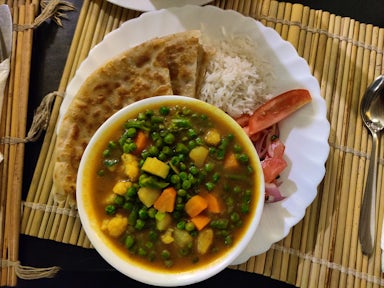
Places to stay in Arusha
In the city
There are several budget options in Arusha, including The African Tulip and the Impala Hotel.
The Impala Hotel: A large hotel with a pool and restaurant, and it is a great option if you are looking for a place to stay after an international flight or the night before a safari.
The African Tulip: A quaint boutique hotel which offers an airport shuttle. Most of the upmarket hotels can be found in the eastern area of Arusha. The Gran Melia Arusha offers fantastic views of Mt Meru, a well-stocked bar, a spa, and a pool.
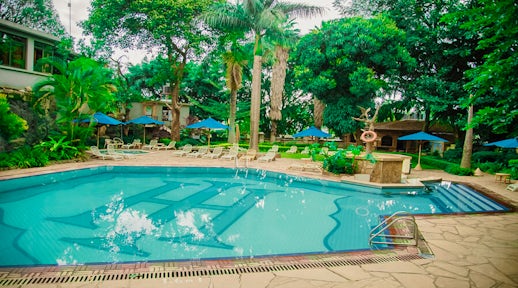
In the suburbs
Some of the best accommodation options in Arusha lie outside of the city. The less expensive options include Onsea House, Rivertrees, and Arumeru River Lodge.
Onsea House: A charming boutique guesthouse that was originally a farmhouse. It has two swimming pools, a sauna, a steam room, and a jacuzzi, and its gardens are tranquil. The guesthouse also has a restaurant which serves delicious food.
The guesthouse is only an hour away from the airport, making it an excellent place to relax before or after a safari. Onsea House offers 2 double suites and a family suite that overlooks the Meru Valley. The adjacent self-contained cottage is perfect for families.
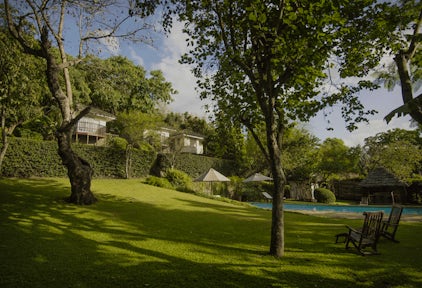
Arumeru River Lodge: A peaceful lodge which offers great access to Kilimanjaro International Airport. It has vast gardens which are home to dik-diks, monkeys and countless bird species. On a clear day, the lodge has exceptional views of Mt Meru and Mt Kilimanjaro. The lodge organises horseback safaris and it is tastefully furnished with traditional dhow furniture.
Rivertrees Lodge: Located on an old coffee farm and with views of Mt Meru and Mt Kilimanjaro, the lodge is an excellent base for trekking. The delicious food matches the high quality of the coffee, and its oven-fired pizza pit is popular with its guests.
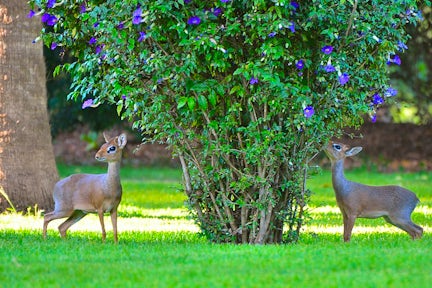
Arusha Coffee Lodge: Just a 25-minute drive from Arusha, this old plantation brims with luxury. The exquisitely decorated rooms are spread across the grounds and each room has its own indoor fireplace. Given that the lodge is a former coffee plantation, it offers tours of the old plantation house and coffee-making process. The theme of coffee runs throughout the hotel – in the bar, restaurant, gardens, and even the spa.
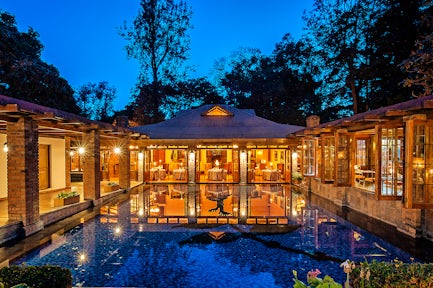
Arusha FAQs
-
Can you get money out in Arusha?
There are some Bureaus de Change in Arusha clustered around the Clock Tower, and some ATMs in the city centre. It is a good idea to stop by these before your safari to take out some notes. There are not many other options during the Northern Circuit and it is good to have cash to buy souvenirs or tip drivers and guides.
-
Is Arusha safe for tourists?
Arusha is relatively safe for tourists, but it is wise not to wear too much jewellery. The risk increases at night, and we do not recommend walking the streets after dark. But in general, the city is known for its welcoming atmosphere, and the people are very pleased to have such a thriving tourism economy, meaning the locals treat tourists well. We recommend that you travel the city by taxi since dala dalas (small minibuses) and bajajis (tuk-tuks) are more dangerous. A taxi ride across town should not cost more than $2.50.
-
Is Arusha worth visiting?
On the one hand, you must visit Arusha on any trip to Tanzania – this is the starting point for some of Tanzania’s most famous sites, including Kilimanjaro, the Serengeti, and Ngorongoro Crater. So, should you stay more than one night in Arusha? There is certainly plenty to do in the town – from cultural programmes, to museums, to shopping to day trips – there is enough to spend at least two days. If you already have a full itinerary, including hiking, safaris, and beach work in Zanzibar, then perhaps it is best to only stay one night in one of Arusha’s attractive plantation guesthouses.
-
What is Arusha known for?
Arusha is known for being the safari capital of Tanzania, and a popular stopover for adventurers who are preparing for a Kilimanjaro trek.
-
Can you see Kilimanjaro from Arusha?
No, you cannot see Kilimanjaro from Arusha. Mt Kilimanjaro is situated 82.6km away from Arusha.
Popular Trips to Tanzania
The tours below showcase just some of what is possible. Use these itineraries as starting points, or to draw inspiration. Then get in touch, and let our expert team help craft the perfect itinerary for you.
Ready to plan your African adventure?
Listen
We'll spend some time listening to your aspirations, then discuss the kind of experience that might suit you.
Match
Next we'll discuss the options, shortlist the best trips for you and present you our impartial recommendations.
Reserve
We'll place a 24 hour hold on your preferred option - without obligation - whilst we talk through the details.
Whatever your budget, group size, length of stay, preferred activity or appetite for adventure, we can help.

